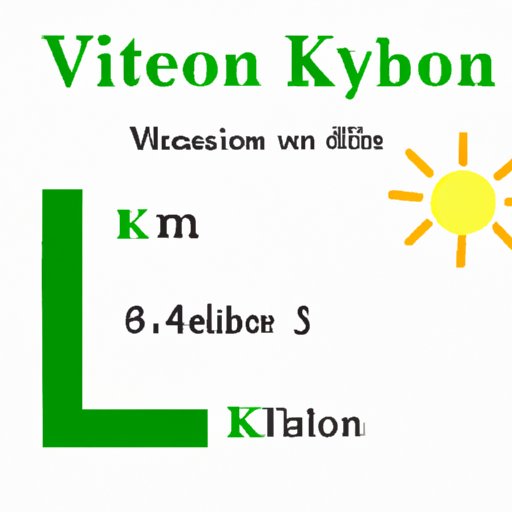
I. Introduction:
Vitamin K is a crucial nutrient that has a variety of functions within the human body. This vitamin is essential for blood clotting and also helps regulate calcium in bones and other tissues in the body. Although it’s not as well-known or as common as vitamins A, B, or C, Vitamin K has remarkable health benefits that are worth exploring.
This article aims to provide an overview of vitamin K and its importance for overall health. We’ll consider its role in promoting heart health, bone health, cognitive function, and reducing the risk of bleeding. We’ll also explore how to incorporate vitamin K into your diet to ensure you’re getting adequate amounts for optimal health.
II. Promoting Heart Health: The Connection Between Vitamin K and Cardiovascular Disease:
A. The role of vitamin K in heart health:
Vitamin K has long been linked to the prevention of cardiovascular disease. This nutrient plays a vital role in activating the proteins needed for the blood’s clotting process, which protects us from bleeding. However, vitamin K also helps boost heart health by preventing calcium buildup in the blood vessels, regulating blood pressure and blood sugar levels, and lowering inflammation.
B. The link between vitamin K deficiency and Cardiovascular Disease:
Studies have found that low levels of vitamin K, especially vitamin K2, can increase the risk of developing coronary heart disease, also known as CHD. This is because vitamin K helps regulate calcium in the body. In the absence of vitamin K, calcium is deposited in blood vessels, leading to hardening and narrowing of arteries, thus increasing the risk of heart disease.
C. How vitamin K can reduce the risk of heart disease:
Research suggests that adequate intake of vitamin K can reduce the risk of CHD by up to 50%. Some studies have also found that people who consume more vitamin K have lower rates of calcification in their arteries.
D. Foods rich in vitamin K for heart health:
Green leafy vegetables like kale, spinach, and collards are excellent sources of vitamin K. Some other foods that are rich in vitamin K include broccoli, Brussels sprouts, and green beans.
III. Nutrition 101: Understanding Vitamin K and Its Benefits for Overall Health:
A. Types of vitamin K and their functions:
There are two primary types of vitamin K: Vitamin K1 and K2. Vitamin K1, also known as phylloquinone, is found in plant foods, while vitamin K2, also known as menaquinone, is synthesized by bacteria in our colon. Vitamin K1 is essential for blood clotting, while vitamin K2 promotes bone health, prevents atherosclerosis, and lowers the risk of cancer.
B. Benefits of vitamin K for overall health:
Vitamin K has significant health benefits, including preventing osteoporosis, reducing the risk of heart disease, and improving cognitive function in older adults. Additionally, studies have found that vitamin K can help improve insulin sensitivity and lower the risk of diabetes.
C. Recommended daily intake of vitamin K:
The recommended daily intake of vitamin K varies by age and sex. For adult men, it is 120 mcg, while for adult women, it is 90 mcg. However, pregnant and breastfeeding women may need higher doses.
D. Food sources of vitamin K:
Some of the best food sources of vitamin K include green leafy vegetables, such as kale and spinach, cruciferous vegetables, like broccoli and Brussels sprouts, liver, and egg yolks.

IV. Why Vitamin K is Critical for Bone Health and How to Incorporate It in Your Diet:
A. The role of vitamin K in bone health:
Vitamin K is critical for bone health as it helps regulate calcium in bones and prevents fractures. It also works in tandem with vitamin D, which helps increase the absorption of calcium in the body, to promote strong and healthy bones.
B. How vitamin K works with other nutrients in bone metabolism:
Vitamin K works with other minerals like calcium and magnesium, and vitamins like vitamin D and vitamin C, to build and maintain healthy bones. Additionally, studies have highlighted the importance of vitamin K in treating osteoporosis, a disease that causes bones to become fragile and prone to fractures.
C. Vitamin K deficiency and the risk of osteoporosis:
Studies have found an association between low levels of vitamin K and an increased risk of osteoporosis and hip fractures in older adults. Vitamin K deficiency causes a decrease in osteocalcin, a protein that helps regulate bone metabolism, and leads to weaker bones.
D. Foods that are high in vitamin K for bone health:
Vitamin K is prevalent in green leafy vegetables like kale, spinach, and collard greens, and in cruciferous vegetables such as broccoli and Brussels sprouts. Other good sources of vitamin K include soybeans, pumpkin seeds, and liver.
V. The Role of Vitamin K in Treating Bleeding Disorders and Its Interactions with Medications:
A. Different types of bleeding disorders and how vitamin K helps:
Vitamin K is essential for blood clotting, making it a critical nutrient in treating bleeding disorders like hemophilia and von Willebrand disease. Vitamin K works by promoting the synthesis of coagulation factors in the liver, which helps the blood clot.
B. Interaction of vitamin K with medication:
Some medications, such as blood thinners, work by blocking the clotting factors activated by vitamin K, which can interfere with its benefits. Therefore, it’s essential to consult with a healthcare provider before using vitamin K supplements while on medication.
C. How to manage bleeding disorders with vitamin K supplements:
Vitamin K supplements are often used to manage bleeding disorders. However, the dosage must be carefully regulated to avoid potential complications. Only a qualified medical professional should prescribe vitamin K supplements.
D. Recommended dosage of vitamin K for bleeding disorders:
The recommended dosage of vitamin K for bleeding disorders varies depending on the severity of the disorder. A healthcare provider should determine the proper dosage for a patient.
VI. Exploring the Relationship Between Vitamin K and Cognitive Health in Aging Adults:
A. The role of vitamin K in cognitive health:
Vitamin K is essential for cognitive health, as it promotes brain function and prevents cognitive decline. It does this by regulating calcium in the brain, which can cause oxidative stress if not regulated adequately.
B. Studies on vitamin K and cognitive function in older adults:
Several studies have found a positive association between vitamin K intake and cognitive function. In one study, men who consumed more vitamin K showed better cognitive performance and attention. Another study found that people who consume less vitamin K are more likely to develop Alzheimer’s disease.
C. Foods rich in vitamin K for brain health:
Green leafy vegetables like kale and spinach, as well as cheeses and fermented foods such as natto, are high in vitamin K. Other foods that promote brain health include nuts, seeds, and fatty fish.
VII. The Link between Vitamin K Deficiency and Chronic Diseases: What You Need to Know:
A. The consequences of vitamin K deficiency:
Vitamin K deficiency can lead to an increased risk of bleeding and can cause severe bleeding in infants and young children. In adults, vitamin K deficiency can cause impaired bone metabolism, increased risk of osteoporosis, and an increased risk of heart disease.
B. Chronic diseases associated with vitamin K deficiency:
The risk of chronic diseases such as atherosclerosis, Alzheimer’s disease, and other cancers have all been linked to vitamin K deficiency. This highlights the importance of ensuring adequate vitamin K intake for optimal health.
C. How to prevent vitamin K deficiency:
Include more vitamin K-rich foods as part of your regular diet. If you have a medical condition that might affect your body’s absorption of vitamin K, such as Crohn’s disease or liver disease, consult a healthcare provider about whether you need to take vitamin K supplements.
D. Recommended daily intake of vitamin K for different age groups:
The recommended dosage of vitamin K varies by age and sex. For adult men, it is 120 mcg/day, while for adult women, it is 90 mcg/day. However, pregnant and breastfeeding women may need higher doses.
VIII. How to Incorporate Vitamin K into Your Diet through Everyday Foods and Supplements:
A. Foods rich in vitamin K and how to prepare them:
Green leafy vegetables like kale, spinach, and collards can be added to a variety of dishes, from salads to smoothies. Other foods like broccoli, Brussels sprouts, and green beans make excellent side dishes. Soybeans, pumpkin seeds, liver, and egg yolks are also good sources of vitamin K.
B. Recommended vitamin K supplements:
If you are unable to consume enough vitamin K through your diet, you may require supplements. Speak to a healthcare provider before taking any supplement to maintain safe and effective dosages.
C. Tips for incorporating more vitamin K into your diet:
Adding a variety of green vegetables to your diet is the easiest way to increase vitamin K intake. Steaming, roasting, or sautéing green veggies will help preserve their nutritional value, and make them more palatable than raw.
IX. Conclusion:
A. Recap of main points:
Vitamin K is essential for cardiovascular health, bone health, cognitive function, and bleeding prevention. Green leafy vegetables like kale and spinach are excellent sources of vitamin K. Low levels of vitamin K can lead to several chronic diseases.
B. Importance of vitamin K for overall health:
Vitamin K plays a crucial role in overall health because it supports healthy blood clotting, bone metabolism, cognitive function, and cardiovascular health. Ensuring adequate vitamin K intake through diet and supplements is essential for optimal health.
C. Encouragement to incorporate more vitamin K into your diet:
If you are interested in promoting your overall health, consider incorporating more vitamin K into your diet. Try adding more green leafy vegetables, cruciferous vegetables, liver, and egg yolks into your meals, or speak to a healthcare provider about vitamin K supplements.





